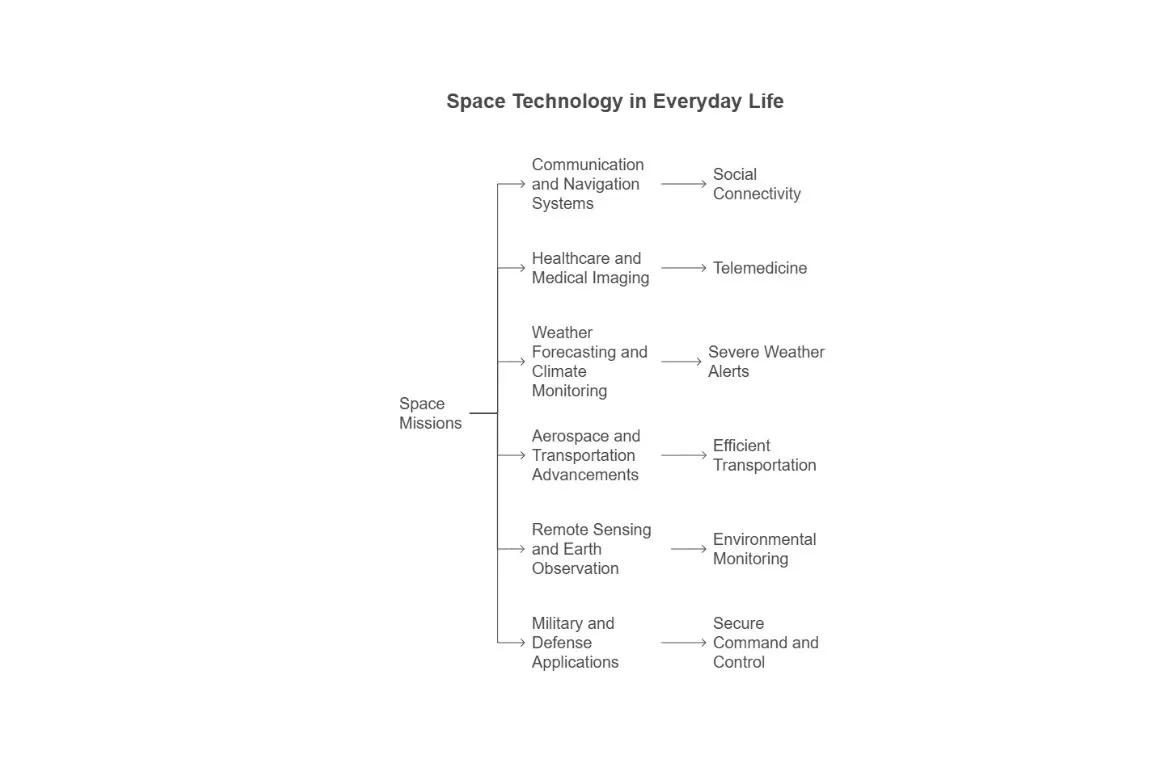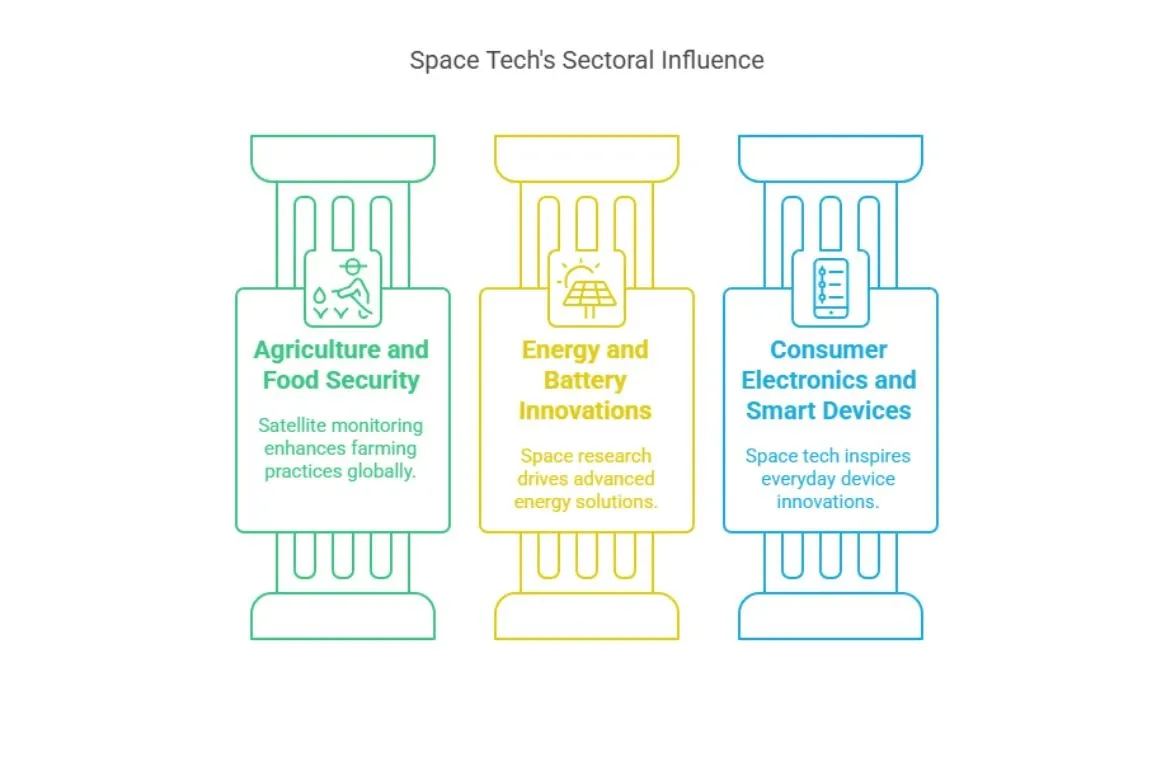Space Technology Used in Everyday Life

Everyone has this preconceived notion that space tech only helps astronauts float in zero gravity. But as time took its toll, space technology spread its wings everywhere. People interact with space-derived advances every day without realizing it. The global space economy, currently valued at $630 billion, is expected to reach $1.8 trillion by 2035. This growth shows its increasing impact on our daily lives.
“Space technology isn’t just floating above us. It’s pulsing through daily life, from medicine to transportation to communication.”
Understanding the Concept of Space Technology
Space technology is the field of engineering and science that focuses on developing equipment, vehicles, and communication systems for space exploration, research, and the utilization of space resources. Space stretches beyond Earth's atmosphere and stands as the frontier for state-of-the-art space technology.
Space technology involves the development and use of technologies for launch vehicles, spacecraft design, payloads, spacecraft operations, and ground-based systems that receive and process data. These technologies fall into different categories based on where they operate and their specific functions.
How Space Technology is Used in Everyday Life

Space missions are just the beginning. Satellite technology quietly powers our modern life in ways most people don't even notice. We depend on systems orbiting hundreds of miles above Earth every day without realizing it.
So, here’s how space technology is used in everyday life, and what the are the top industries that are being influenced by space technology:
Communication and Navigation Systems
The Indian Space Research Organization (ISRO) has developed an extensive network of communication satellites, notably the GSAT (Geostationary Satellite), to facilitate seamless connectivity across the nation.
India's advancements in space technology, particularly in communication and navigation, have not only created social connectivity by bridging distances but also established a technological strength in modern society.
Healthcare and Medical Imaging
Space technology has transformed medical diagnostics through better imaging techniques. India's vast geography and rural population present challenges in healthcare accessibility. ISRO established its telemedicine program in 2001 through satellite communications to connect urban medical facilities with faraway healthcare centers.
Through this initiative, patients located in distant areas can receive real-time medical services, including diagnosis and treatment planning.
Weather Forecasting and Climate Monitoring
Weather satellites deliver vital data for forecasting and climate research. Currently, 322 Earth observation satellites orbit our planet: 23 are geostationary and 223 are polar-orbiting. These satellites monitor temperature changes, track storms, and measure precipitation patterns. Satellite data now forms the basis for 88% of all severe weather alerts.
Aerospace and Transportation Advancements
Satellite technology improves transportation through better navigation, instant communication, and monitoring systems. Public transportation runs more efficiently with GPS data that tracks vehicles in real time. Mobile applications use satellite positioning to spot traffic jams and identify road hazards.
Remote Sensing and Earth Observation
Scientists use remote sensing to study Earth's physical characteristics from space. This technology helps them track forest fires, monitor cloud patterns for weather prediction, and map changes in urban growth or deforestation over decades. Earth observation data benefits agriculture, forestry, and water management.
Military and Defense Applications
Military forces rely on satellites for reconnaissance, precision targeting, and early warning systems. The Space Based Infrared System plays a crucial role in defense and security by detecting missiles and providing early warnings. Satellites also ensure secure command and control of military forces while sharing critical information globally.
Sector-Wise Impact of Space Technology
Space exploration impacts major sectors of the global economy and yields practical solutions that improve our daily lives. Technology from space shapes vital industries that power modern living, from the food we eat to the power we use at home.

Agriculture and food security
Satellite monitoring systems have changed farming practices around the world. Remote sensing satellites provide farmers with live data on crop conditions, weather patterns, soil health, and water resources. Farmers now use satellite images to find suitable spots for eco-friendly energy sources, track solar radiation, and check wind speeds.
Energy and battery innovations
Space research speeds up energy solutions we can use on Earth. The connection between the space and energy industries began with the development of solar panels 60 years ago. NASA's state-of-the-art solid-state battery research has created power systems that weigh 30-40% less than regular batteries and store three times more energy. These batteries work in temperatures almost twice as hot as those of lithium-ion batteries without requiring complex cooling systems.
Consumer electronics and smart devices
Space exploration has sparked numerous innovations that are now found in our everyday devices. It has had a profound influence on the development of consumer electronics and smart devices in India, leading to innovations that enhance daily life. Originally designed for space missions, these technologies have been adapted for use on Earth, resulting in advanced features in everyday gadgets.
The Future Trends and Innovations for Space Technology
The space industry stands at a turning point. Government control gives way to ground-breaking innovation and easier access. Space technologies of tomorrow will blend into our daily lives and expand into completely new areas.
Private sector investment and commercialization
The space sector has seen rapid commercialization over the last several years. India's space startup ecosystem has grown from just a few companies to nearly 200 private ventures. This growth came after key policy changes.
The Indian Space Policy 2023 now allows non-government entities to participate in all space activities. Private space startups received more than Rs 1,000 crore in funding during the nine months of the 2023-2024 financial year. The global space economy is expected to grow from ₹53159.68 billion in 2023 to ₹151.88 trillion by 2035.
Sustainable space tech for Earth applications
Space technologies now line up with the Sustainable Development Goals. Earth observation satellites help monitor climate, boost agricultural output, and manage water resources. Space innovations contribute directly to:
- Food security through precision farming and crop monitoring using highly advanced systems.
- Clean water initiatives for water purification and recycling technologies.
- Energy sustainability through advanced battery research and renewable energy monitoring
Space technology now reaches way beyond exploration. It offers solutions to humanity's biggest challenges.
Conclusion
Space technology has evolved beyond ambitious missions to distant planets and has become an integral part of our everyday lives. This article has explored how breakthroughs designed for space now improve life on Earth in amazing ways. Your morning commute relies on GPS systems, while hospitals save lives with advanced medical imaging. Space-derived technologies quietly support the foundation of modern society.
The real-life applications go way beyond what most people think. Satellite data has made weather forecasting much more accurate. Farmers now use precision agriculture to boost yields while saving resources. Memory foam mattresses and scratch-resistant lenses show how space research benefits unexpected areas of our lives.
The economic impact stands out clearly. This growth creates unprecedented opportunities for engineers and professionals in any discipline to use their expertise.
As space technology increasingly shapes our everyday lives, gaining specialized knowledge becomes essential.
An Advanced Certification Programme in Space Technologies can equip engineers and professionals from any discipline with the skills to innovate, adapt, and apply their expertise in emerging fields. By deepening their understanding of satellite systems, communications, navigation, and space-driven technologies, participants can unlock new career paths, contribute to real-world applications, and become active players in the expanding space-tech ecosystem that impacts life on Earth.
Space technology's rise reminds us of the true potential of human ingenuity. Systems that watch distant galaxies now help us track climate change, manage Earth's resources, and connect people worldwide. This exchange of ideas between space and Earth continues to expand, promising groundbreaking discoveries that will change our daily lives in ways we can't yet imagine.
Frequently Asked Questions
Q1. How does space technology impact our daily lives?
Space technology influences our daily lives in numerous ways, from GPS navigation in our smartphones to weather forecasting and climate monitoring. It also plays a crucial role in telecommunications, agriculture, and healthcare, thanks to advanced medical imaging techniques.
Q2. What are some examples of space technology?
Memory foam mattresses, scratch-resistant lenses for eyeglasses, water purification systems, and even baby formula enriched with nutrients are examples of space technology.
Q3. What is Space Technology used for?
Space technology is used for exploring outer space, studying planets and stars, supporting communication and navigation systems, monitoring the Earth's environment, advancing medical imaging, and improving everyday technologies such as GPS, weather forecasting, telecommunications, and disaster management on Earth.

TalentSprint
TalentSprint is a leading deep-tech education company. It partners with esteemed academic institutions and global corporations to offer advanced learning programs in deep-tech, management, and emerging technologies. Known for its high-impact programs co-created with think tanks and experts, TalentSprint blends academic expertise with practical industry experience.



